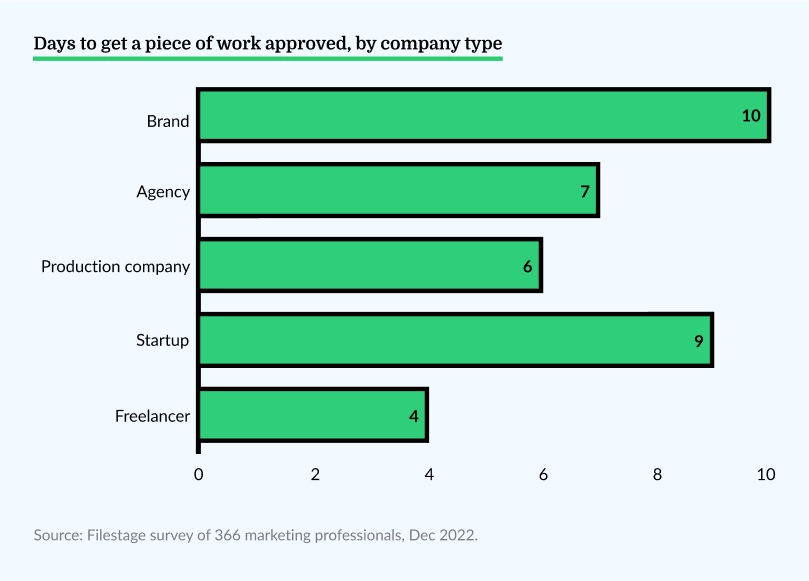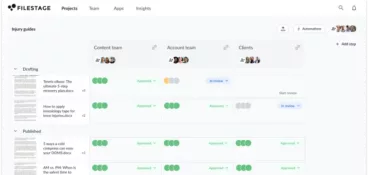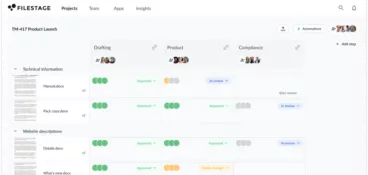As a project manager, chasing people for approval is an all-too-familiar part of the job. Endless emails. Missed deadlines. And a long list of people who now consider you an enemy.
In fact, our recent report on The State of Creative Collaboration in 2023 highlighted that this is one of the top bugbears of project managers in creative industries worldwide.
But it doesn’t have to be like this!
Make 2024 the year that you stop chasing people for approval once and for all. Sound unrealistic? Trust me, it’s not. In this guide, I’ll share my three top tips to stop chasing people for approval, so that you can sit back and let the feedback come to you.
7-in-10 project managers say chasing people for approval slows their team down
Our report highlighted that 7-in-10 project managers say their team is slowed down by having to chase people for approval. And it wouldn’t be so bad if that only meant chasing one or two people, but a typical creative project involves getting approval from multiple stakeholders.
Typical reviewers might include:
- Account managers
- Creative directors
- Strategists
- Marketing managers
- Brand managers
- Legal team
- Clients (and all of the above client side)
That’s a lot of people to request approval from in the first place, and a lot of people to have to chase.
Why late feedback sucks for project managers
Project management is all about keeping organized and making sure everything stays on track. That includes meeting deadline after deadline along the way.
But when feedback arrives late, timelines get derailed. In fact, 3-in-4 project managers say waiting for feedback slows them down. Here’s why that sucks.
All your resource planning goes out the window
You fight for resources when you think you’ll need them. But you can’t always swap that time for work on another project, leading to dead time for your creatives that can’t be billed.
It sucks for you, it sucks for your creatives, and it sucks for your budget.
You have to bring in freelancers to pick up the pieces
A shift in your timelines means the resource you booked is no longer available. The only solution is to bring in freelancers, which often causes the budget to fall apart.
And it means those who were involved from the beginning might not get to finish what they started, which sucks!
It almost always means working late
Delayed feedback often means you’re forced to stay late to respond to and clarify feedback, and to prepare amends for creatives in a way they’ll actually understand them.
No one wants to work late. It’s 2023, after all.
In short, late feedback sucks!
On average, it takes project managers eight days to get a piece of creative approved
We’ve analyzed hundreds of review and approval processes from creative teams worldwide and found that it takes, on average, eight days and 3.2 versions to get a piece of work from v1 to approved.

Frankly, it shouldn’t take that long. Especially given that much of that time is spent waiting around for stakeholders to provide feedback.
“From my experience consulting on approval workflows, brands and marketing teams definitely have the most complex review processes. But by introducing consistent, transparent, and centralized review steps, I’ve seen teams shave days off their review rounds.”
Jennifer Becker, Team Lead Customer Success at Filestage
Three tips to stop chasing people for approval and let the feedback come to you
Project managers typically spend 2.5 days waiting for feedback. And when you’re playing the waiting game, all you want to do is chase chase chase. After all, the sooner you get feedback, the sooner you can get on and keep your project moving in the right direction
But imagine for a moment that you didn’t have to chase. And instead, you could sit back and let the feedback come to you.
Here are three tips to make that a reality.
1. Set deadlines for your stakeholders
Setting a due date for every review step means that your stakeholders have a deadline to work towards. This helps them to prioritize, holds them accountable, and keeps your project moving forward.
It’s important to adjust the message depending on the stakeholder, as each person will have different priorities (and different achilles heels). For example, you might tell the creative director that the sooner they give feedback, the more time the team will have to refine the creative. An account manager might respond best to messaging about getting it over to the client early to keep them sweet. And for the client, it may be about avoiding going over budget.
With Filestage, you can add due dates to your files to keep your projects on track. And we’ll send automated reminders to any reviewers who haven’t shared feedback or given approval yet.
See, no more chasing!
2. Point out which parts you need feedback on
If you only need feedback on certain things for this version, let your reviewers know so they don’t waste time. Make it clear exactly what you want them to review, whether that’s the layout of a brochure, the shot selection in a video edit, or a specific paragraph in a written document.
Being as specific as possible helps to speed things up, because the task seems less intimidating for reviewers, and you don’t have to spend time chasing when certain stakeholders miss the point.
3. Tell your reviewers how you want them to share your feedback
Email? Slack? WhatsApp? When it comes to sharing feedback, there are multiple routes your reviewers can take. It’s a minor thing, but having to make this choice can slow things down. And you’re left with the task of collating it all too.
Take the thought out of choosing where to give feedback and help to keep things centralized with a specialist review and approval platform like Filestage.
With Filestage, reviewers can provide their feedback in a clear and visual way. Here’s how:
- In-context comments: tap anywhere on the file to leave a comment in real time
- Annotations: draw on videos, images, and documents to bring comments to life
- Attachments: attach files to your comments to share references, company logos, and anything else your team may need
Stakeholders can clearly see what others are saying, discuss feedback and any disagreements, and iron out any conflicting opinions there and then.
Final thoughts
Thanks for reading! I hope you’re feeling inspired and ready to make 2023 the year that you stop chasing people for approval.
If you’d like to see for yourself how Filestage can help with your feedback and approval process, start a trial and take it for a spin!









